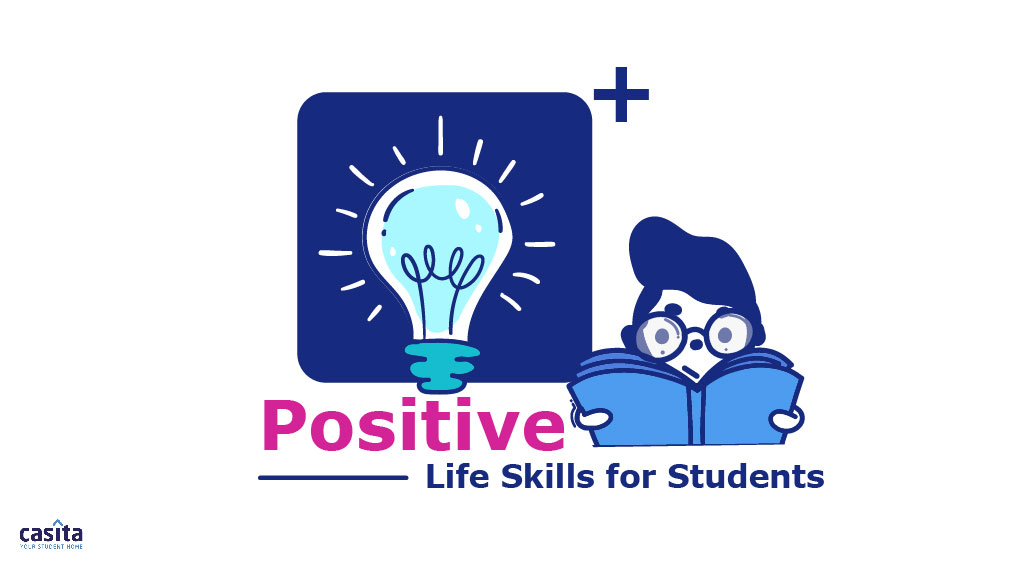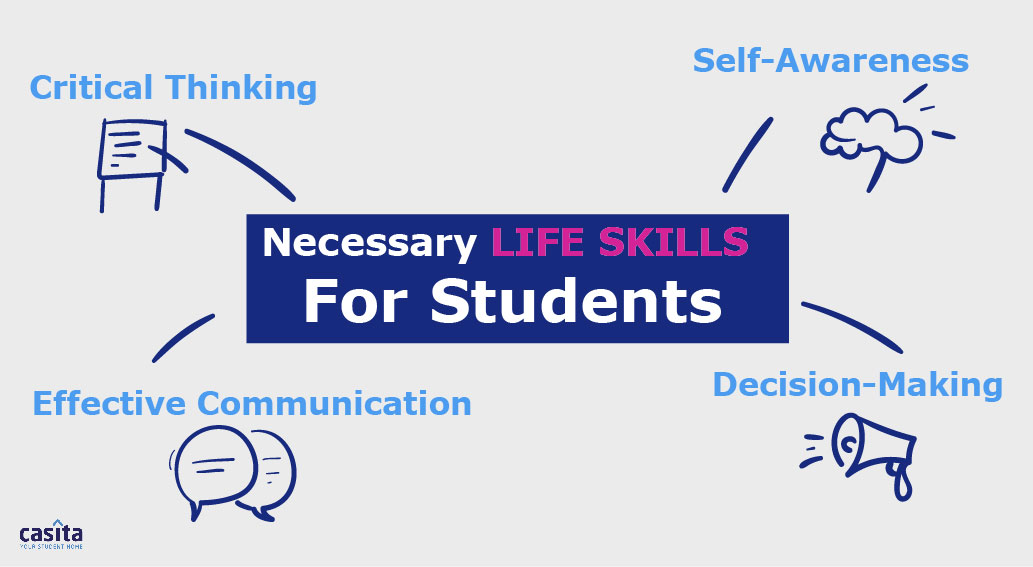How to Develop Positive Life Skills for Students?
Tips and Advice
University Life
7 mins read
Share

Updated at: 25 November, 2025
Published at: 18 August, 2022
By Samir Badawy
How to Develop Positive Life Skills for Students?
Tips and Advice
University Life
7 mins read

Updated at: 25 November, 2025
Published at: 18 August, 2022
By Samir Badawy
Share
Personal development is among the benefits of studying abroad. In general, you should always seek to improve and gain life skills to improve your personal life and appeal to future employers. Life skills, according to various sources, are a set of skills that help you overcome challenges and make the most of life.
Keep reading to get more insight into the top life skills for students, which include basic life skills and additional life skills. We will also include ways to identify the need for improvement while mentioning how to develop these positive life skills.

Basic Life Skills That Students Should Have
According to UNICEF, basic life skills are psychological and interpersonal skills, which aid in building relationships, making decisions, empathising with others, communicating effectively, and so much more.
1. Self-Awareness
We cannot start our list of the most essential life skills without considering self-awareness, which, coupled with critical thinking, can help you determine your strengths and weaknesses. Self-awareness means understanding oneself, which can be your greatest asset.
Self-awareness leads to many other skills, which include managing stress, emotional regulation, positive thinking, and self-esteem. Self-awareness is so rare and essential that it is dubbed the “Golden Soft Skill”.
How to Become Self-Aware
To develop self-awareness, being curious about getting to know yourself is essential. You could also keep a journal where you can note down your trigger points, both positive and negative, while also writing down your strengths and weaknesses.
An interesting psychological concept is the “blind spot”. Everyone typically has a hidden side not visible to themselves but visible to others. It can always help to ask for feedback from trusted friends, family members, and colleagues.
You can also take various personality tests for reference, which can help you understand yourself better. Other recommended tips and tricks to boost your self-awareness are meditation, accepting criticism, and keeping in touch with your emotions (listing down how you feel).
Signs You Need to Improve Your Self-Awareness
Some of the signs that you may need to work on your self-awareness include the following:
You tend not to take accountability and not accept negative criticism
You find it difficult to pay attention to others and actively listen
You tend to prioritise short-term rather than long-term happiness
You tend to focus on the negative and often find yourself critical
You often find yourself making the same mistakes
2. Critical Thinking
Critical thinking skills are among the most important life skills for students. It refers to carefully analysing and evaluating concepts based on observations, experiences, reflections, and communication, among other ways of gathering information.
Self-awareness coupled with critical thinking is essential in developing many other skills, such as decision-making skills, which can help you solve problems, as well as social skills, such as social intelligence and effective communication.

How to Develop Your Critical Thinking Skills
As previously mentioned, critical thinking is how you extract and analyse information in various ways. With that said, some ways to develop critical thinking include letting go of personal biases (keeping an open mind) so that you do not let them interfere with your analysis. Always be cautious when gathering information, and try to interpret it while taking different perspectives and keeping an open mind.
It is also very important to ask questions, keep researching, and try to spot biased information. Critical thinking also heavily applies to decision-making as the first step of decision-making should always be observation and critical thinking, which is used before and after deciding to evaluate it. Critical thinking is not just essential to have in your personal life but is also an extremely in-demand skill in the marketplace.
Signs You Need to Improve Your Critical Thinking Skills
There are various ways to spot whether or not you need to improve your critical thinking skills, and these include the following:
You often find yourself jumping quickly to conclusions
You fall short of not recognising others’ biases
You often find yourself taking a one-sided position
You often find yourself losing track of your purpose
3. Decision-Making
Decision-making is very important, as it is built on understanding the situation while maximising the benefits of opportunities. Decision-making requires critical thinking skills and self-awareness of what you can and cannot do. Decision-making helps you choose the right path between various alternatives and is important as our choices affect us and those around us.
How to Develop Your Decision-Making Skills
Developing better decision-making skills will help you plan your life, make important decisions, have better time management, and be as effective and efficient as possible. To improve those skills, you must constantly develop a plan while weighing out your different options, setting deadlines, limiting your options to stay on track, practising decision-making by taking smaller decisions and remembering to learn and improve constantly.
Signs You Need to Improve Your Decision-Making Skills
You find it difficult to focus
You often find yourself procrastinating
You find yourself avoidant to decision-making
You often feel overwhelmed when making decisions
You often tend to take a lot of time to come up with a decision
4. Effective Communication
Effective communication is one of the main skills you must use for day-to-day interactions. It is how to communicate best or transmit information. It also contains critical thinking as an essential component. Effectively communicating in a social setting would refer to having conversations that are engaging, consistent, and offer value. It is a vital skill as it helps you avoid misunderstandings, avoid conflict, build trust, keep your listeners engaged, and help solve conflict. Effective communication also extends to body language, as communication is generally verbal and non-verbal.

How to Develop Your Effective Communication Skills
If you wish to establish positive communication skills, then you should follow the 7 Cs model, which is:
Concise: keeping things clear and brief
Clear: being straightforward
Concrete: not being vague or broad
Correct: do not present false information or facts
Complete: make sure that your message has all of the necessary elements that you wish to convey
Coherent: your message should flow naturally, in sequence, and be logical
Considerate: You should always consider any party involved in the conversation and not negatively affect them
Signs You Need to Improve Your Effective Communication Skills:
You find yourself having the same arguments
You often feel misunderstood
You avoid certain topics
You find yourself needing to re-explain yourself
5. Resilience
Resilience refers to the ability to withstand and quickly recover from difficult situations. It is an essential skill, as you will often find yourself meeting new challenges and should always adapt to and overcome them.
New challenges do not necessarily weaken you; even if you think they do in the short term, they will always benefit you in the long term by building up your resilience and adding new skills to your personality.
How to Develop Your Resilience
Some of the ways you can develop your resilience include the following:
Challenge yourself by going out of your comfort zone
Be optimistic about getting out of difficult situations
Being committed to a plan
Strengthen your problem-solving skills
Welcoming change
Learn to relax
Be compassionate to yourself
If things get difficult, never shy away from asking for help
Signs You Need to Improve Your Resilience
If you find yourself being stuck in situations for long periods of time
If you find yourself dealing with your issues in an unhealthy way
If you feel like you’re having issues trusting your abilities
If you feel like you quickly get overwhelmed
6. Stress Management
Stress management is often said to be on the opposite side of the same coin as resilience, as stress directly affects your resilience. An example of the link between both is that the more resilient you are, the better you will deal with stress. Stress management is primarily concerned with reducing the impacts of stress on oneself, both physically and psychologically.

How to Develop Your Stress Management
Learn Meditation
Keep your sleep in check
Self-reflect
Identify the things that trigger you
Use affirmations
Learn to say no when necessary
Practise self-compassion
Signs You Need to Improve Your Stress Management
If you find yourself having difficulty relaxing
If you feel constantly anxious
If you find yourself having a short temper
If you have difficulty focusing
If you feel overwhelmed
7. Time Management
Time management is effectively organising your day to get the most things done, so be as efficient and effective as possible. This is done through various methods, such as scheduling, breaking your tasks into smaller bits, and prioritising your tasks.
How to Develop Your Time Management
Learn how to prioritise tasks
Understand yourself and your needs (how much time it takes to complete tasks)
Constantly try out new techniques (example: time blocking method)
Analyse what works best for you
Develop a plan
Signs You Need to Improve Your Time Management
If you find yourself constantly missing out on deadlines
If you find yourself struggling to be punctual
If you find yourself constantly getting burned out
If you get easily distracted
8. Budgeting
Budgeting, especially for students and self-sufficient individuals, is an essential part of everyday life, with many parents teaching their kids to budget and save money at the earliest opportunity. Budgeting is a financial literacy skill (a combination of various financial skills) that focuses on managing your money through monitoring your spending and increasing your savings.
It is a vital skill, as mismanaging your finances and not tracking your expenditures can be a major stressor. You can also find effective ways to budget in our Tips to Reduce Cost of Living in the UK blog, of which many tips are applicable in different countries.

How to Develop Your Budgeting Skills
Start setting savings goals
Keep a record of your spending and plan ahead
Prioritise expenditures
Start experimenting with different budgeting techniques (for example, the 50-30-20 rule)
Signs You Need to Improve Your Budgeting Skills
You find yourself constantly worrying about expenses
You find yourself overspending and falling short
You are not able to save up or fail to reach your saving goals
You often find yourself miscalculating expenses
Most in Demand Skills for Students
Now that we have discussed the best life skills for students, we’ll head over to include some of the most requested skills in the job market.
Management
Management is the most needed skill in 2023, according to LinkedIn, and many of the previously mentioned principles, such as decision-making, effective communication, resilience, stress management, and resilience, are heavily applied in management. It will require you to demonstrate leadership, collaboration, risk-taking, social intelligence, and much more as you oversee a team.
Leadership
Leadership is another demanded skill to have, which entails having a positive influence over others and rallying them on. Leadership is a highly requested skill by employers.

Communication
Communication is important, not only for yourself but also for your teammates. It is often said that communication’s impact on businesses is so strong; if poorly done, it can lead to poor outputs (for example, sales) and even strained relationships with your bosses and colleagues.
Teamwork
Teamwork is one of the vital personal skills that you must develop and as cliche as it sounds, teamwork does really make the dream work. Companies are built on teamwork, as it is always a team effort resulting from strong collaboration.
These skills, especially leadership, communication, and teamwork, are especially important in today’s hybrid work environment, as workers do not necessarily have to meet face-to-face and will require strength in those skills to be as efficient and effective as possible.
We cannot stress enough the importance of constantly developing yourself and your skills, as you must be open to continuous improvement. And even if you have certain shortcomings, it is never too late to learn and develop yourself. You can also find various interesting tips and advice, such as Studying at Night: Night Owls Studying Tips and Tricks, and Ways to Embrace Cultural Differences While Traveling, among others.
Tips and Advice
University Life
By Samir Badawy
Share
Tips and Advice
University Life
Updated at:
Published at:
By Samir Badawy
Share





